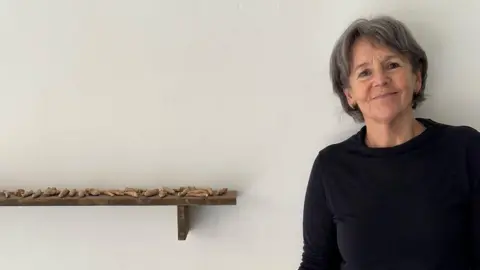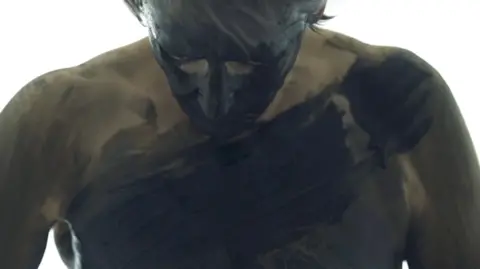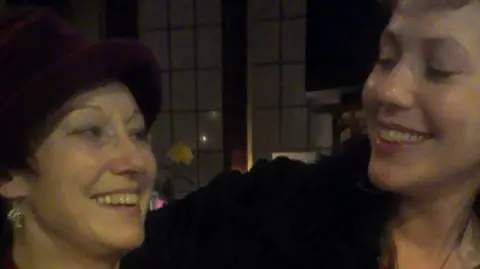'There's no textbook on how to grieve properly'
 Kat Lyons
Kat Lyons"I think of grief as sitting in an orchestra pit, and every single instrument is playing a different tune at top volume. How are you ever going to hear music through that?"
Those are the words of Kat Lyons, who lost their mum to breast cancer in 2017, and says they think of grief as something you deal with "bit by bit".
Death and bereavement are something we all inevitably experience in our lifetimes. More than three million people are bereaved in the UK each year, yet according to research by Marie Curie in 2024, about 51% of respondents felt we don't talk about death and dying enough.
Researchers have said the way we approach the subject is to blame, and to combat the stigma, a new centre for grief research and engagement has opened at the University of Bristol.
Kat, who works as a poet and a creative writing facilitator and lives in Langford, North Somerset, has been involved in Weston-super-Mare's Good Griefs Festivals, which encouraged conversations about death to help people deal with bereavements.
They said: "I don't think you can ever prepare for it [death]."
"You feel like the rug is out from under your feet.
"I was like, 'I'm an adult. I can do this stuff' and, of course, you absolutely can't even make a cup of tea, brush your teeth, all the things," they said.
Kat said they needed to put their grief "in a box and lock it down" to manage day-to-day life.
And then, to process grief, they said people needed to "gradually open the box" and not do it all at once.
For artist Helen Acklam, who lives in Bristol, locking away the loss of her daughter Gail, who was stillborn, had a profound impact on her.
Pregnant at 16 and growing up in the "very religious" and "very tight community" of the Welsh Valleys, Helen said the stigma of being a teenager and having baby loss "made it a very difficult experience".
"I think, for a lot of women who had stillbirths in the 70s and 80s, we didn't have a voice," she said.
With that in mind, Helen said she had no way of talking about or describing her loss and instead felt "silenced" and "angry".
"I went in alone to have Gail and then came out on my own. All the things which had been collected, like nappies and the things you get ready for baby, were gone. My father took care of everything.
"All the stigma and shame of the family, the community - I absorbed all that," Helen added.
She said she only started processing the loss of Gail after seeing a news report of someone going through a similar experience decades later.
Helen said she did not even go to the funeral, something Kat found very important.
Kat said their mum's funeral was the first they had ever attended and without rituals like funerals, it can be difficult to process that someone has died.
 Helen Acklam
Helen AcklamMeanwhile, Helen said she underwent her own ritual years after Gail's death which helped her heal.
"I went back to her grave, which I'd never visited, and I suppose quite literally, dug into the earth and dug into myself," she said.
Taking earth from Gail's graveside back to her art studio, Helen has since used it in her work, a way of taking back what happened to her.
"There were times when it was incredibly painful. I was crying. I had the mud on me, I was right in it," she said.
 Helen Acklam
Helen AcklamFor Kat, writing about loss has helped them cope.
"It lets you approach grief indirectly because you're holding the pen and you can put it down.
"It allows this small measure of control at a period where you feel absolutely out of control," they said.
However, Kat acknowledges people grieve "in different ways".
"A common misconception is there is a very linear journey - that everyone goes on in the same way," they said.
With that, Kat said they feel people are also worried about "doing grief wrong".
Kat said during their grief journey, they had often questioned their reaction.
"I was like, 'I should be collapsing on the floor and crying. Why am I doing my tax return instead?' - or 'I shouldn't be going out partying, because you know that is wrong, because how can I party when my mother is dead?'."
"There is no way to grieve correctly," they said.
"We aren't textbook and grief isn't textbook," they added.
 Kat Lyons
Kat LyonsFor Helen, processing loss is helped by talking openly about it, as "shying away" from the "natural feelings" causes damage.
Helen said that years after her loss, she found out her parents had experienced a stillbirth themselves.
Had she been able to speak to them about it, she said she would have known what she was "going into".
Dr Lesel Dawson, the co-director of The Bristol Centre for Grief Research and Engagement, said some people find talking about death uncomfortable as they can "awaken our own fears of mortality" and "our loved ones dying".
But she added she hopes the research centre "will help people feel more confident" in having open conversations around grief and death.
One of her ideas is having grief education in schools.
"I think it could radically change the way society thinks and talks about death.
"There's lots of ways of talking about death and grief, through stories, through biology, through different cultural approaches to death and grief," she added.
'An act of love'
Kat agreed and said some find the vocabulary around grief difficult to manage.
"They do this kind of head tip and the soft voice and they're very concerned.
"Then after three months, anyone who hasn't been bereaved just stops asking because they're thinking it's been quite a long time but that's just the start of it.
"You will survive, even though it feels like you won't," said Kat.
Helen said loss changed you as a person as you learn to live with the loss.
"Grief is not something you get over, the person you love has died and that is a loss you will carry with you through your whole life," Dr Dawson, who also runs the Good Grief Festival said.
Kat added: "It's very messy, and we might suddenly get really angry and then we might suddenly get really sad and it doesn't really matter as long as we're feeling.
"It is just the flip side of love. If you don't love someone, then you're not going to grieve them. Grieving is an act of love."
If you or someone you know has been affected by the details raised in this story, advice on where to find help and support can be found at BBC Action Line.
Follow BBC Bristol on Facebook, X and Instagram. Send your story ideas to us on email or via WhatsApp on 0800 313 4630.
